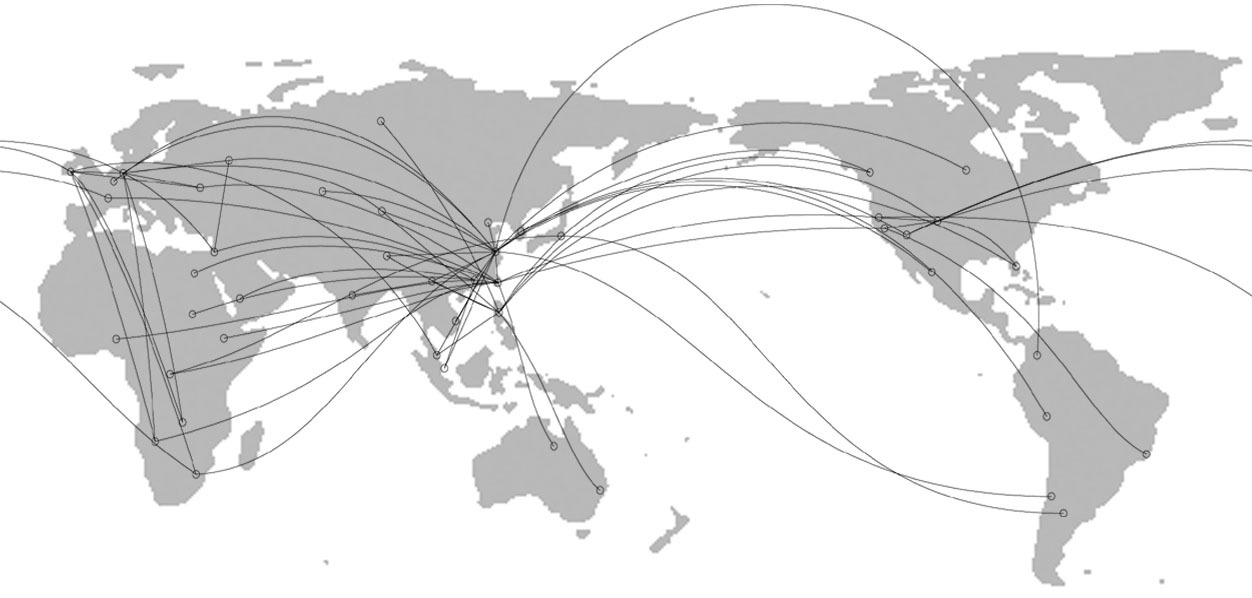The Whole Chain Traceability Consortium™ is currently comprised at its core of researchers, educators, extension specialists and collaborators at Oklahoma State University, North Dakota State University, Michigan State University, the University of Arkansas, and Pardalis, Inc., an Oklahoma advanced information technology company. These institutions are joined together by "sharing is winning" principles. Steve Holcombe, Pardalis' CEO, serves as a networker and coordinator among, between and beyond these institutions.
The vision of the Whole Chain Traceability Consortium™ is that new strategies for "whole chain" management of agricultural and food data - with a security model - are needed. We believe that these new strategies will increase the availability and quality in supply chains of transparent data. We believe that these new strategies will open up exciting sustainable business models for both large and small agricultural companies. We believe that social networking, the emergence of the "Internet of Things", and mobile technologies are dynamically driving this need. And, for instance, we believe that consumers will significantly benefit from real-time access to new data related to the safety of their food.
Whole Chain Traceability Consortium™ coalesced in preparing food safety proposals for over $50M in 2010 USDA NIFA agricultural funding. In August 2011 notification was received of an award (~$550K/3 YRS) under the USDA National Integrated Food Safety Initiative. Pardalis' enterprise-class, multi-tenancy is at the heart of that project. This project begins a process for a patent-hardened open source licensing strategy for food and ag supply chains branded with Pardalis’ Whole Chain Traceability Consortium™.
The Web was originally conceived as a tool for researchers who trusted one another implicitly. Building in the missing layers of trust and provenance that make possible “whole chain” information sharing is one of the “next Big Things” for the Internet. Global patent portfolios are expensive and time-consuming to obtain and protect. Pardalis has been patiently building a formidable global patent portfolio in the U.S., China, the EU and other countries since 2001. These patents cover critical methods for introducing trust and provenance to whole chain information sharing with information-centric networking.
Other funding activities - both national and international - are in process. That includes a pre-submission seeking funding under the NSF Partnerships in International Research and Education (PIRE). On 19 October 2011 the Whole Chain Traceability Consortium™ - led by Oklahoma State University - filed a pre-submission entitled "Advancement of a whole-chain, stakeholder-driven traceability and supply chain management system to improve food safety and reduce food waste". As well phrased by Leo Bonanni of SourceMap, global trade in agricultural and food products is a series of discrete transactions between buyers and sellers. It is generally difficult – if not impossible – to determine a clear picture of the entire life cycle of such products.

The goals of the proposed NSF PIRE research are epitomized by a vision of consumers able to point a smartphone at a food product bar code, and retrieve a global sourcing map and reliable information about the product. This access may help save peoples lives in a food safety recall, verify sustainable agricultural practices, and learn more from consumers about their personal experiences with food products.
Domestic collaborators with the Whole Chain Traceability Consortium™ in the NSF PIRE pre-submission include Top 10 Produce, LLC and SourceMap. International collaborators include Dr. Sjaak Wolfert, Sr. Scientific Researcher on ICT in Agri-Food Supply Chain Networks at the University of Wageningen, the Netherlands, and Coordinator of the EU funded Smart Agri-Food Project. Also, Prof. Maohua Wang, College of Information and Electrical Engineering, Chinese Agricultural University – Beijing, China. Prof. Wang is Director of Strategic Research on Key Technology of Agricultural Information Technology funded by National Science Foundation of China.
Check out this and other funding opportunities being discussed and considered by the Whole Chain Traceability Consortium™ at http://pardalis.squarespace.com/funding-opportunities/">http://pardalis.squarespace.com/funding-opportunities/.
There are three social networking sites for the Whole Chain Traceability Consortium™. One is the Whole Chain Traceability Funding Opportunities networking group on LinkedIn. Another is on Facebook at the Whole Chain Traceability Consortium page. There is also a Twitter account at @WholeChainTrace. For more information, visit any of these websites or contact any of the following:
-
Dr. Brian Adam, Oklahoma State University Professor of Agricultural Economics - http://agecon.okstate.edu/faculty/profile.asp?id=brian.adam&type=faculty
-
Dr. Michael Buser, Assistant Professor in the Department of Biosystems and Agricultural Engineering - http://bioenergycenter.okstate.edu/faculty/Buser
-
Dr. Deland Myers, Professor and Director, School of Food Systems, North Dakota State University - http://www.ag.ndsu.edu/foodsystems/contactus.html
-
Dr. John Stone, Co-Director and Sr. Research Scientist, at the Center for the Study of Standards in Society, Michigan State University - http://cs3.msu.edu/people/profile/stone-john/
-
Dr. Jean-Francois Meullenet, Head and Professor, Department of Food Science, University of Arkansas - http://foodscience.uark.edu/2349.htm
-
Steve Holcombe, Pardalis, Inc. - http://www.linkedin.com/in/steveholcombe
 Steve Holcombe
Steve Holcombe